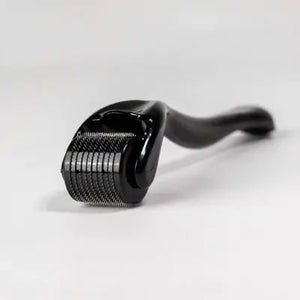
Hair loss caused by painkillers - what to do?
Table of contents
- Hair loss is a common side effect of painkillers
- Why can painkillers cause hair loss?
- Cause research and diagnostics as a basis for treatment
- Is a hair transplant helpful?
- Conclusion: Painkillers can cause hair loss
Hair loss is a common side effect of painkillers
On average, a person loses 100 hairs per day. This is completely normal and nothing to worry about. Hair loss occurs when your scalp hair becomes visibly thinner and you notice an increase in hair on your clothing, pillow, floor, or in the shower or bathtub drain.
Initially, hair loss is diffuse and primarily occurs at the crown, the top of the head, and the temples . If the medication is administered over a longer period of time, the scalp becomes increasingly visible, and the hair thins noticeably.

You don't have to choose between pain and thick hair, but simply rely on pain treatment products that are gentle on your hair and have less impact on your body.
More than half of all patients experience increased hair loss due to painkillers. The risk is reduced with short-term or lower-dose medications, whereas strong painkillers or long-term treatment can lead to severe hair loss and even baldness .
Why can painkillers cause hair loss?
Taking painkillers can sometimes cause hair loss. This is because some painkillers, particularly nonsteroidal anti-inflammatory drugs (NSAIDs) such as ibuprofen and aspirin, inhibit the body's production of prostaglandins . Prostaglandins are hormone-like substances that play an important role in regulating inflammation and pain in the body.
However, prostaglandins also play an important role in promoting hair growth. By inhibiting prostaglandin production, painkillers can also impair hair growth and promote hair loss.
Hair loss is a well-known side effect listed in the package insert, and it particularly affects people with existing hair problems. However, even if you don't suffer from hereditary hair loss and had very thick, healthy hair until the start of treatment, taking the medication can trigger a reversal. If you experience severe, diffuse hair loss due to medication, you should consult your doctor and, if necessary, seek a new treatment for pain management.
Cause research and diagnostics as a basis for treatment
You didn't experience hair loss before taking painkillers. The hair loss and the painkiller treatment occurred at the same time. In this case, you can almost certainly assume that this is a temporary problem resulting from the treatment.
However, in most cases, the cause is not so clear and not readily apparent. If your hair doesn't recover even after stopping the medication and continues to fall out, you should seek medical advice and have the cause diagnosed . For medication-induced hair loss, switching to a less potent medication is often a safe solution.

Your doctor will conduct a comprehensive examination to determine which active ingredient is causing your hair loss. Patients who take pain medications for a long time or permanently are most commonly affected by thinning hair and hair loss, including the root.
If it is not possible to stop or restart medication, hair loss cannot be stopped with painkillers.
Is a hair transplant helpful?
If you suffer from severe hair loss due to taking painkillers, a hair transplant is an effective option for you. This method allows hair follicles to be individually harvested from a donor area of the head and transplanted into bald areas. A successful hair transplant can significantly improve the appearance of your hair and help boost your self-confidence.
However, it's important to note that a hair transplant is an invasive procedure and should be carefully planned. You should consult with an experienced physician to ensure you are a good candidate for the procedure.
Healing takes between three and six months and may require you to avoid certain medications and avoid further hair loss with painkillers. Your hair will then grow back, and you'll soon be able to enjoy radiant, full hair .
Conclusion: Painkillers can cause hair loss
Generally, if you take painkillers frequently or for a long time, you should consider whether an alternative, less harmful treatment might be appropriate. In addition to hair loss caused by painkillers, pharmaceutical preparations have a whole range of other side effects and complications.
You can treat your post-medication baldness with a hair implant. This means you don't have to choose between pain and thick hair growth.
At the hair clinic, you will receive valuable recommendations for aftercare after your hair transplant and tips on alternative approaches to pain management and how to choose a treatment that is both health- and hair-friendly . Pain relief and hair growth don't have to be mutually exclusive.



















